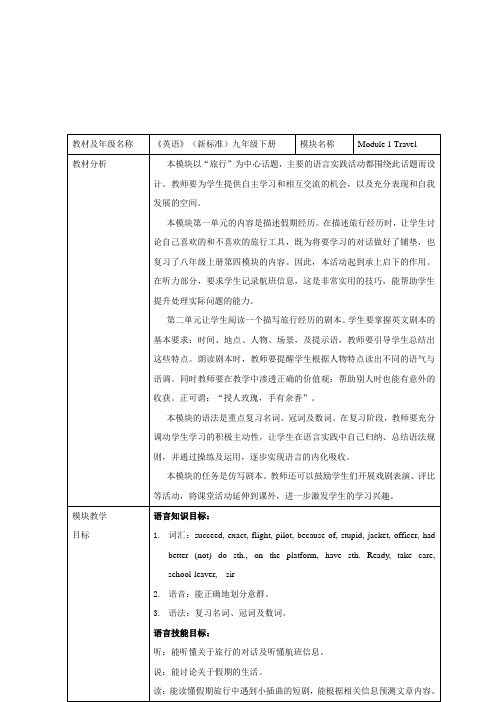外研版九年级英语下册教案Module_1
2020-2021学年 外研版英语九年级下册 Module 1Unit2课件

2. Did Li Lin find his own seat first?
Yes, he did.
3. In fact which car should the elderly man be in?
In fact he should be in Car 9.
It’s a long story.
(Li Lin and Li Wei are on the station platform, saying goodbye to each other.)
Li Lin: Tell Mum and Dad I’ll miss them... I’ll miss you all.
telling me what sort of car that is? 5. That __e_ld_e_r_ly_ lady had died of old age.
Module 1
Unit 2 It’s a long story.
Read and answer the questions:
短上衣;夹克
____j_a_c_k_e_t_____
确切地;完全
____e_x_a_c_t_ly_____
毕业生
_______s_c_h_o_o_l-_l_eaver
笨的;糊涂的
____s_t_u_p_id______
从方框内选择适当的词并用其正确形式完成句子。
elder stupid sir officer jacket
ticket. Oh, I see the problem. This is Seat 12A, but you should be in Car 9. This is Car 8. Elderly man: Oh, how stupid of me! I’d better go and find Car 9.
外研版初中九年级英语下册Module 1 集体备课教案教学设计含教学反思

Unit 1We toured the city by bus and by taxi.目标导航教学过程预习指导:一、方法指导1.学生自主预习本单元中新的单词和短语,注意单词的发音和意思。
2.了解本单元话题,搜集相关资料,预习Activity 3中的对话。
二、预习检测Ⅰ.根据句意及汉语提示完成单词。
1.Jack succeeded(成功) in passing the exam at last.2.She drove directly(直接地) to the school after work.3.I’d like to learn about my flight(航班) from London to Tokyo.4.I want to be a pilot(飞行员) in the future.5.I can’t remember when exactly(确切地) she left the city.Ⅱ.根据句意用所给词的适当形式填空。
1.Mike succeeded in getting(get) to the top of the mountain.2.You’d better not go(not go) there by bike because it’s far away.3.They’re looking forward to meeting(meet) you.4.Chang An Avenue is one of the busiest(busy) streets in Beijing.5.There’s something to buy(buy) here as long as you have enough money.课堂教学:Step1情景导入Teacher shows some pictures of the way that people travel and guides students to talk.T: How do you go to school?Ss: I go to school by car/bike/bus....T: How do you most like to travel by?Ss: I most like to travel by car/boat/plane....Step2听前准备1.学习新的单词及短语。
外研版英语(新标准)九年级下册教案(全册)

A. 能理解关于学校及学校生活的对话。
B. 能比较不同的学校。
3. 情感目标:
培养竞争和合作精神。
教学重点与难点3.重点:
A.能理解关于学校生活的对话。
B.能学会描述个人的学校生活。
4.难点: 能与朋友或同学交流关于学校生活的话题。
教学辅
助
多媒体,投影仪,收录机,图片
教学策
略
交际法、自下而上教学法
教学内容教学活动设计意图
教师活动学生活动
Step 1: 导入:
3.让学生讨论关于学校的各种信息;
4.教师让学生运用词汇描绘学校,鼓励2-4对学生在
班上分享自己的看法。
Talk about school. What do you think of to describe
“school”?
可以点击课件中的超链接,可讨论校园、校服、教室安排等内容。
采用“头脑风暴”方式讨论旅行方式,很容易激发起学生们的学习兴趣,并能自然而然地引出本节课所学内容。
在几个重要的词汇,如campus, school uniform, classroom等,还设计了超链接,点击这些词汇,可以让同学们看到中
《英语》(新标准)(初中阶段)九年级下册M4教学设计
《英语》(新标准)九年级下册Revision Module A 教学设计。
外研版九年级英语下册Module1课件

Choose the best answer.
⑤ The young man in Lin’s seat would get off the train __________.
A.) at Beijing B) at the next stop C) at Lin’s village D) at Hangzhou ⑥ How long would Lin stay on the train? A.) 10 minutes. B) One day. C) 12 hours. D) More than seven hours.
2. Key Phrases: set off, get off
3.Key structures: Sentence structure Now it was in front of him, to set off soon. I’ve got a long way to go. (重点)
4. To get information from the reading material. (难 点)
I’d like a double room with a sea view. You’ll need to speak to the tall woman with
fair hair.
Explain the difficult points:
4. I've got a long way to go. 我要坐很长时间的火车。 Have a long way to go 通常表示“(为达到某个标 准)仍有许多事要做”。例如: Li Lin has still got a long way to go before she becomes a successful teacher. Be patient. We’ve still got a long way to go.
英语九年级下外研版Module2Unit1教案

初三的学生学习了关于学校方面的词汇,本单元几乎没有新的词汇,对话也相对较为简单,学习本单元应该很轻松。
学法指导
Communicative approach
教 学 过 程
教学内容
教师活动
学生活动
效果预测
及补救措施
修改意见
一、
Wraming-up/lead-in
1.Revise thewords aboutschool.
2.Work inpairs and talkabout yourschool.(Activity 1)
3.Listen andcomplete thesentences.
(Activity 2)
二、Listening
1.listen andread.Nowcomplete
Susie’scolumn
3.To be able to predict which words the speakers is likely to stress.
教学重点
to understand the conversation about schools
教学难点
To talk about the differences between different schools
课 题
M2,U1 They don’t sit inrows.
课时
1
课型
Listening andspeaking
修改意见
教学目标
1.To be able to understand the conversation about schools
2.To be able to compare different schools
外研版九年级英语下册课件Module 1 Unit 1

Which of these forms of transport do you …?
subway
light rail
Work in pairs. You may talk like this:
A: Do you like travelling? B: Yes, I like it a lot. A: How do you often travel? B: I often travel by plane. A: What about you? C: I often travel by train. A: We all like travelling. It’s very
3) A: What are you going to do next weekend? B: I have no idea. How about you?
4) A: What a nice dinner! Well, I’d better get back to work. I’ve got a ton of work! B: Me too.
Last Sunday evening, / most of my classmates / went to Christmas party / held by Mr. John.
A. At home.
B. In the USA.
C. In the UK.
3. How did Daming go to Hong Kong?
A. By air.
B. By train.
A
C. By boat.
4. What did Betty think of her trip in B Beijing? A. Not bad B. Wonderful C. Sad
2019年外研版英语九年级下册教学课件:Module 1 Unit 2 It’s a long

a high-speed train ticket
起始站 乘车时
间
车次
终点站
车厢和 座次
You can buy train tickets at the railway station or on the Internet.
take off是“动词+副词” 型短语,名词作宾语时, 放在off前后均可,但人 称代词作宾语时,必须 放在off之前。
When did the plane take off?
飞机是什么时候起飞的?
[造句H] e came into the room and took off his jacket.
-------M---o--d-u--l-e--1---T--r-a-v--e-l--
-----------------------------
Unit 2 It’s a long story.
初 中 德 育 个 人总结 初中德 育个人 工作报 告总结 德育个 人总结 初德育 个人工 作总结
初 德 育 个 人 总结|初 德育个 人工作 总结 初 德 育 个 人 总结|初 德育个 人工作 总结
班 主 任 队 伍 建设。 每
学
习
目
标
1 学习本单元新单词及短语: sir, officer, stupid, jacket, take care;
2 谈论旅行经历;
3 读故事,讲故事,写自己的旅行经历。
课堂导入
Ask and answer. Yes, I have.
I went to Hangzhou by train last summer vacation.
外研版九年级英语下册课件:Module1-Unit1

要点梳理
重点词汇精析 1 succeed的用法 【教材例句】But the pilot succeeded in landing on time. 不过飞行员成功地按时着陆了。(教材第2页) 【要点思维导图】
【举例】If you work hard, you will succeed. 如果你努力 工作,你就会成功。 His new book was a great success. 他的新书获得了巨大 的成功。 He aims to be a successful writer. 他的目标是成为一个 成功的作家。 At last, he successfully solved the problem. 最后,他成功 地解决了这个问题。 Alice was successful in the competition.艾丽斯在比赛中 取得了成功。 He is certain to succeed in doing his experiment. 他一定 会成功地完成他的实验。
2.到上个月末,我们已经生产了两千辆汽车。 ______B_y__th_e__e_n_d_o__f ___ last month, we had made two thousand cars. 3.在当地一位导游的帮助下,他们最终到达了山顶。 With the help of a local guide, they reached the mountain top___i_n_t_h_e_e_n_d____. 4.一直往前走,你会在这条路的尽头找到这家医院。 Go straight and you’ll find the hospital ___a_t_t_h_e__e_n_d_o_f__ the road.
B. How about
- 1、下载文档前请自行甄别文档内容的完整性,平台不提供额外的编辑、内容补充、找答案等附加服务。
- 2、"仅部分预览"的文档,不可在线预览部分如存在完整性等问题,可反馈申请退款(可完整预览的文档不适用该条件!)。
- 3、如文档侵犯您的权益,请联系客服反馈,我们会尽快为您处理(人工客服工作时间:9:00-18:30)。
Module 1 Travel教学设计I. Teaching goals 模块教学目标II. Teaching material analyzing 教材分析本模块以“Travel”为话题,以学习谈论自己或他人的旅行为主线,介绍了旅行中发生的事件。
通过模块学习,学生将重点掌握定冠词与不定冠词的用法,并能运用所学知识介绍自己或他人的旅行经历。
Unit 1 通过听、读、说训练,初步学习谈论旅行的方法。
V ocabulary and listeningActivity 1要求利用所给的词回答问题,学习或复习一些交通工具的表达方式。
Activity 2利用所给词汇听录音回答关于旅游的问题。
Activity 3再听一遍填写表格。
Activity 4听读一段Lingling, Betty, Daming谈论各自旅行的对话, 学习关于旅行的一些表达方式。
Activity 5根据对话完成表格,听对话录音核对答案。
Activity 6根据对话内容回答问题, 要求对对话深入理解。
Activity 7根据对话内容完成句子, 注意because, so and although, but 的用法。
Pronunciation and speakingActivity 8听录音,按照意群朗读句子。
Activity 9根据意群朗读对话并听录音改正读得不对或不好的地方。
Activity 10两两活动,就彼此的旅行进行口语练习。
Unit 2 通过读、写训练,学习谈论旅行途中的经历。
Reading该单元共设计了4个活动。
Activity1看短语猜测文章内容,读文章给句子排序。
文章介绍了Lin的第一次坐火车旅行的经历。
Activity 2根据文章选择最佳答案, 注意文章的细节。
Activity 3两两活动,根据文章回答问题,加深对文章的理解。
WritingActivity 4写下自己旅行途中的难忘经历,从而练习关于旅行文章的写作。
Unit 3 对定冠词与不定冠词及“谈论旅行”的功能项目进行综合训练:Activity 1用a, an, the 填空。
Activity 2选择符合句子的最佳答案。
Activity3根据实际情况完成句子。
Activity 4看图完成表格, 要求学生能看懂飞机票。
Activity 5听录音完成表格。
Activity 6根据表格回答问题。
Activity 7阅读短文完成表格,写出文中介绍飞机的优缺点。
Activity 8再次阅读Activity 7的短文把数字与事件连线。
Around the world介绍了飞行员Charles Lindbergh第一次飞渡大西洋的经历。
Module task要求学生描述一次旅行经历。
III.Class types and periods 课型设计与课时分配Unit 1 Listening and speakingUnit 2 Reading and writingUnit 3 Revision and applicationIV. Teaching plans for each unit分课时教案Unit 1 The flight was late.Target language 语言目标:1.Key vocabulary 重点词汇airplane coach departure lounge transport2.Key phrases 重点短语departure lounge full of because of have a good time by bus/coach3.Key structures 重点句式The trip back was very long.I had to stand for over six hours.It’s the busiest season in China because of Spring Festival.Better get back to work.We’ll have a great time.Language skill 能力目标:Enable the students to listen to and talk about trips.To improve listening and speaking ability.Teaching methods 教学方法Listening and speaking, pairwork, group workTeaching important/difficult points教学重难点How to talk about trips.Teaching aids 教具准备Tape recorder, a projector and a computer.Teaching procedures and ways 教学过程Step 1 GreetingStep 2 Warming up and lead-inIn this procedure, try to make students understand the new words.Step 3 Listening and speakingAsk students to listen and answer the questions in activity 2.Step 4 Listening and readingAsk the students to listen to the conversation and answer the teacher’s questions. Show the questions on the screen.Step 5: Everyday English1 …the trip back was very long.返回的旅途很长。
2 Better get back to work.最好还是回来学习。
3 …plenty of fun things.许多有趣的事情。
4 We’ll have a great time!我们会玩的很愉快的!Step 7 PairworkAsk students to listen to and say the conversation in activity 8 and then read the conversation in activity 9 again, paying attention to the intonations.Step 8 GroupworkThen ask them to work in groups of three or four, talk about your holiday and this term. Homework1.Learn the new words by heart.2.Act out the conversation in groups.3.Finish off the workbook exercises 1-7.Unit 2 You’re sitting in my seat.Language goals 语言目标1. Key vocabulary重点词汇nod tear towards cigarette though2. Key phrases 重点短语set off push…away look out of get off3. Key sentences重点句子Don’t forget where you come from.Write to us as soon as you get there.I’m getting off before you.Even if it’s only 10 minutes, you should move.Language skill 能力目标Read and grasp the main idea of the articles.Enable the students to talk about their trips they have made.Write something that happened during a trip you have made.Teaching methods 教学方法Reading and writing, pair work, group workTeaching important/difficult points教学重难点Learn to talk about and write something that happened during a trip you have made. Teaching aids教具准备A tape recorder, a computer and a projector.Teaching procedures and ways教学过程与方式Step 1 GreetingStep 2 RevisionEncourage students to act out the dialogue in Unit 1.T: First, I’ll check your homework. Which group can act out the conversation in Unit 1? Ss:…(acting out the conversation in groups of three)T: Well done! Now let’s compare which group is the best?Ss:…group 3…T: Yeah, the winner is Group 3. Congratulations!Ss: Hooray!Step 3 Warming up and leading inShow the following pictures and talk about trips by train with students.\Step 4 Listening and readingListeningT: Today we are going to learn a story. Do you know what it will be about? Let’s listen to the tape and answer my questions. OK?Q1. What does the story happen?Q2. Where is Lin going?Q3. Does Lin have the right ticket?Ss: …Check the answers with the whole class.T: OK! Let’s read the story quickly and number the phrases in the order they happen. Ss:…(reading the passage)T: Are you ready? Let’s check the answers.Ss:…(showing the answers)Show the following on the screen.1.Lin often dreamed about the _____, and about going to the ______.2.Lin ______, _______ to speak.3.Lin looked at the other ________ for help.4.I am ____ _____ before you.5.It’s ____ hours away from her e.Sample answers:1. train; capital2. nodded; unable3. passengers4. getting off5. sevenStep 5 PairworkWork in pairs to talk about the answers to the following questions.Step 6 Language notes1.Now it was in front of him, to set off soon.火车现在就在他前面,马上就要开了。
